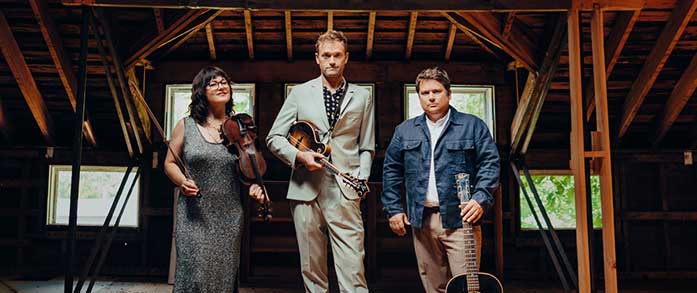
With their amazingly adventurous new album, Celebrants, Nickel Creek makes a dynamic return, one that marks a full nine years after their last offering, A Dotted Line, an album which, in turn, arrived a full nine years after its predecessor, Why Should The Fire Die? Still, in their case, quality isn’t forestalled by consistency. Their spate of awards — as IBMA’s Emerging Artist of the Year in 2000, IBMA’s Instrumental Group of the Year the year after, and ongoing Grammy Awards and CMA nominations, along with the Grammy they won for Best Contemporary Folk Album courtesy of This Side — all attest to the innovation they can claim when it comes to bending their boundaries.
Nickel Creek is Chris Thile on mandolin, Sean Watkins on guitar, and Sara Watkins on fiddle. All three sing. Jeff Picker is bass player for the new album and tour. The band formed when the three primary contributors were in their teens, and their rapid rise to success was something to behold.
In every regard then, Celebrants comes across as a decidedly bold offering, one that’s unrestrained as far as melody, motif, and the trio’s obvious enthusiasm. It represents the latest phase of a creative career initiated early on, one that foretells the future more than it simply revisits the past.
Bluegrass Today recently had the opportunity to speak to Sara Watkins shortly before Nickel Creek embarked on a tour that takes them across the country, and to any number of major festivals. Both amiable and articulate, she was only too happy to share some insights into the thoughts that inspired the new album.
Even before we delve in depth into the backstory, it ought to be mentioned that there’s quantity as well as quality here. The new album boasts 18 tracks, making it a very generous offering indeed.
Our goal at first was for this album to be contained as one traditional length album length, which is what, like 47 minutes or something? That was our goal. We didn’t want people to miss listening nearing the final parts of the record. Anytime we make an album, especially with our producer Eric Valentine, we do what we call a practice swing, which means we go in, and we sit in a semicircle with maybe three mics, and we play the entire record. Or at least all the songs on the record. So that’s what we did, and usually getting that down takes about a week. This time it took, well, I’m not sure exactly how long it took. It’s like a sketch of the album, basically. But with this album, we had a pretty a theoretical sequence going, because, as you may notice, a lot of the songs sort of relate to each other, and lead into each other. So we wanted to be confident in the sequence before committing to it on record. Ultimately, we changed a tiny bit of one instrumental and one instrumental went away, and another instrumental kind of came into it, and then we made a couple of tiny tweaks. But, really, for the most part, it was all there. It was all intact.
Nevertheless, that in itself is quite out of the ordinary. There’s a lot you express. It’s kind of reminiscent of the Beatles’ Abbey Road in a way, especially the way the songs flow into one another. So how will that that in live performance? Will you perform it so that the songs flow in sequence?
I think that’s going to be really fun process. We’ll definitely include some of the transitions, but some may be a bit challenging to perform live. However we plan to incorporate some older material and fold it into the newer songs, and hopefully build some some fun transitions out of that. The idea will be to show the relationships between the the music, because it all does come from a similar place. So, that’ll probably be really fun. I’m looking forward to that. And we’ll get to do that very soon. We hit the road in just a couple of weeks.
You’ve received so many accolades over the course of your individual and collective careers. Having achieved all those honors early on, does it ever enter your mind that given all you’ve achieved, you have this enormously high bar to measure up to? Is it almost intimidating in a sense?
I feel incredibly privileged that we don’t feel that way. We’re aware of who our audience is, and we want them to be happy, but we also know that they won’t be happy if we’re doing something that we don’t believe in. And, ultimately, that’s really what matters. If you’re just trying to please somebody else and you’re not happy, then there’s no point. Why go do something that you’re going to enjoy?
So I think for us, there is no other alternative. We would just not do this if the only alternative was to only make music that that we didn’t believe in 100%. In this case, there was no other record we could make at this point in time, even if we wanted to. It’s not like we had three records in front of us and we chose this record to make because this is the only record we could make at the time. This is where all of the choices led us. This is where all of the decisions led us, and with each each decision of each song, we then decided let’s do this.
Were you all in sync with the choices?
If someone disagrees, then we talk it out. And we figure out what we what we want to do. And all of those choices led us here. And that this is the album that we made, the only one we could have made, because anything else would have been a sacrifice in a way that betrayed who we are as a band. So again, this is the only album that we could make, and the one that we wanted to make. And we’re really, really proud of it.
As well you should be. It’s such a dynamic and express album. And it’s a really a bold step forward. You took it well beyond any expectation in terms of the concept, and the execution, which we would imagine, and as you were saying, was the result of a lot of planning time and discussion and opportunity to really figure out where you wanted it to go, even before you actually went into the studio to do it.
I don’t think a lot of people realize that anytime people make something creatively, that they’re making choices. Some people say that a song just like came to them, and then it was finished, and it was done and dusted. But mostly, when people are making something like this it’s because they’re making a choice. “I like it when the melody goes up rather than down. I like it when the guitar does this little turn a couple times before we come back to the verse.” All of these things are choices anytime anyone hears it, and I say that because I don’t want someone to feel like the music is calculated in any way, where it doesn’t have heart. I feel like Nickel Creek has so much heart, and so much love and so much joy,
That’s pretty evident in hearing this new music.
I’m so glad to hear you say that. What we’re trying to say on this album is that the pursuit of joy is not always easy. The pursuit of joy is not always joyful, and it’s not always easy. A lot of times joy is what you feel when you’re really in the trenches, or even in the midst of a conflict or a struggle. If I’m struggling for something that I truly believe in, if I’m struggling for something that I really want, and desire, then that struggle can can be a joy. And I think that this album is largely about a pursuit of connection and engagement. In any connection, there’s going to be friction, or gravity. So what we’re trying to say is, a lot of what we’re singing about is the stuff that life is made of. It’s not always sexy, and it’s not necessarily tragic or dramatic. Most people have something like that in a relationship, or simply in life. It’s about finding the middle.
That business that so many of us are in right now — where you’re choosing to stay, or you’re choosing to remain, is not because everything’s terrible. You have to continue to engage, and that might be in a friendship, or that might be about a job, or maybe it’s just about figuring out who you are as a person. It might be about engaging with your partner, with your kids, or with the place that you live. It could be about anything, but it takes work and it takes deliberate and intense effort. It’s as much about the good stuff as well as it is about the heart and the turmoil and the struggles.
What you’re saying is totally profound and totally meaningful. So it begs the question — was there something you learned about each other and maybe about the chemistry that you have as this band Nickel Creek? Was it a connection to a learning process that you were picking up again after nine years?
I think it’s always a learning process. Being in relationship with people is always a learning process. One of the benefits of the time away we spent away from each other is finding the clarity of how people change and develop, and how that’s a beautiful thing. We’re all changing and developing. And sometimes when we’re in tight, tight proximity to people, that change is not perceivable or not allowable, because we accept it, and we expect things to not change so that they can be dependable. And one of the beautiful things about the space that we have frequently found in this band, is that it affords us the perspective of realizing how beautiful that change and growth and development can be in your collaborators, or in your friends and family.
That certainly is a learning process, and in a very essential way, part of what means to come of age.
I also think it gave me a lot of delight in my own change, and my own development as an individual. There was a while there when we were all spending so much time together in our early 20s, where I felt like I didn’t know what I think about it. And I would look to the band for answers about how I felt about certain things. It was because I felt so engrossed with the group. As I’ve become an adult, I think that’s a normal thing. So as I was growing up and engaging in all the things that time affords, I really relish that process and that evolution. Finding those differences and commonalities and celebrating all of that is good and normal and part of life.
Celebrants is available from popular download and streaming services online, and directly from Nickel Creek as downloads, audio CDs, or vinyl LPs.







